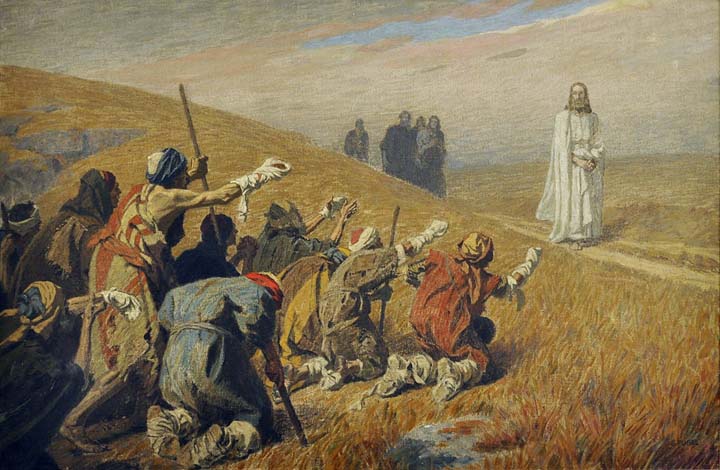October 13, 2013
Luke 17:11-19
A number of religious truths are immediately apparent in today’s gospel. This passage tells us that we, like the ten lepers, can approach Jesus for healing. It also insists that, like the Samaritan who was healed, we should always be thankful. But there are other truths in this gospel passage that can be discovered, if we ask the right questions. Here is a question we can ask: Why did nine of the lepers who were cleansed not return to give thanks to Jesus? Were they simply dull or selfish? Why does it seem that they closed their hearts to gratitude?
If we were to ask those nine lepers this question, here is what they might say: “We were very grateful that Jesus healed us. That is why we chose to do what he asked of us. Jesus commanded us to go and show ourselves to the priests. When we were cleansed, we decided that is exactly what we should do. We did not return to thank him, because we thought it was more important to obey him.” Seen from this perspective, it is the nine lepers who follow Jesus’ command, and it is the Samaritan that sets his command aside and returns to give thanks. Jesus, of course, accepts the Samaritan’s decision. In so doing, he reveals a new meaning to this gospel: sometimes the best decision that we can make is one that is different from what God commands.
Now, of course, this truth needs to be embraced carefully. God’s commands are good and holy. The teachings of our Church are beneficial to us and should be respected. And yet, there are times when our lives do not fit into what God commands. In those times, we must choose what it is that we will do. The Catholic tradition, for example, highly respects the gift of marriage. We understand it as a sacrament and believe that the faithful love of husband and wife is a sign of God’s love for us. Yet, it is possible to find oneself in the midst of a marriage that is dead, a marriage without love and cooperation. Even though God asks us to be faithful for a lifetime and we have made a commitment to love another person as long as we live, we sometimes face the reality that that is a commitment we cannot follow. We understand in our faith that Christ asks us to live in a certain way and yet there might be people we love, our children or our friends, who choose to express their sexuality in a way that is contrary to Church teaching. We do not want to condone their decision, but neither do we want to break our relationships with them. Jesus commands us that we are to love our neighbor and forgive our enemies. We are told to turn the other cheek. And yet, there are times when our attempts to love someone only lead to manipulation and abuse, when the person that we forgive hurts us again and again. Even though Jesus commands that we love our neighbor as our self, sometimes we need to break a relationship to save our self. In circumstances such as these and in others, we may discover that our lives do not fit into what God commands us. When we find ourselves in those situations, we need to choose to save as much good as we can and then continue to live.
The Samaritan in today’s gospel is so filled with joy that he sets aside Jesus’ command and returns to give thanks. Jesus accepts his decision. In so doing he makes this story an assurance that he will treat us in the same way. When we find ourselves in circumstances where it is impossible to do what God asks of us, we must make the best decision we can. If we make that decision wisely and selflessly, we can trust that Jesus will understand and accept us. This story even dares to suggest that the compromised decisions that we make might in time give us reason to be thankful.

